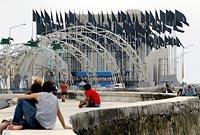Life is tense for U.S. diplomats in Cuba

HAVANA — Every time his dog acts strangely or the power goes out at his home, Bill Hawkins wonders, if only for a moment, whether Fidel Castro's agents are trying to get under his skin.
"Anywhere in the world, stuff happens to you," said Hawkins, a building-security engineer posted at the U.S. diplomatic mission in Havana. "Here, you never really know if just life is happening, or if someone's doing it to you."
Life is tense these days for the 51 Americans assigned to the U.S. Interests Section, the diplomatic mission in the Western Hemisphere's lone communist-ruled nation and enduring thorn in Washington's side.
Interviewed at the Interests Section last month, five U.S. diplomats talked about trying to lead a normal life in Havana.
Nearly all, like Hawkins, say they are targets of a Cuban government-sponsored harassment campaign aimed at disrupting the activities of the mission and the lives of its staff.
U.S. diplomats tell of endlessly ringing phones and dog feces strewn inside their homes, urine-soaked towels left on a kitchen table and even poisoned family dogs. A high-ranking member of the mission once found his mouthwash replaced with urine.
Government agents follow them in public, say the Americans, and provoke them at social events. Some tell of sexual come-ons from strangers, a gambit designed to compromise them or damage their marriages.
"It's all just a reminder that they're there," said mission spokesman Drew Blakeney, who arrived in Havana last fall with his wife and child.
At a party in May, a stranger came up to Blakeney's wife and claimed that her husband was being unfaithful. Recognizing the provocation, she told the man off, Blakeney said.
He and others play down the harassment, saying the nuisances cannot compare to the government persecution that Cuban dissidents must endure.
But the persistence of the Cuban agents "makes Ceaucescu's Romania look like real amateurs," Interests Section chief Michael Parmly said, referring to the last and notoriously harsh communist ruler of Romania.
Diplomats' claims of low-level harassment are nothing new, but Cuba's actions appear to have intensified since January, when the Interests Section began scrolling anti-Castro news and commentary from an electronic billboard. Cuba quickly struck back, sending nearly 1 million people to march in protest past the Interests Section and installing a cluster of 138 flagpoles nearby to block the view of the billboard.
Tensions escalated last month, when U.S. officials complained that Cuba cut electricity to the mission for several days.
Attempts to reach the Cuban Interests Section in Washington were unsuccessful. The missions are known as interests sections because the two countries have had no formal diplomatic relations since the 1960s. Both missions operate from the same buildings that once served as embassies.
A recent front-page editorial in the Cuban Communist Party's newspaper, Granma, flatly denied interfering with the U.S. mission. "Our Revolution would never attack or violate a diplomatic office," the editorial said. "It never has and it never will."
But the U.S. diplomats say they often come home to unpleasant surprises: furniture moved slightly, windows left open or freezers unplugged. Some have found a white powder sprinkled around their doorways and gates.
The Cuban government makes its presence known outside the Interests Section building, too. Security huts perch at each end of the complex, and guards photograph visitors from afar and demand passports before allowing people to enter.
Some of the torments seem more like the work of a poltergeist or a band of fraternity brothers than a national government.
Hawkins, who was posted earlier in South Africa and Georgia in the former Soviet Union, once found the covers torn off some matchbooks he had at home, but the intruders left the matches behind.
Parmly says Cuba also is withholding visas for newly assigned U.S. diplomats and barring the mission from hiring Cuban employees for maintenance and clerical work, leaving at least 25 vacancies at the mission.
One junior officer, whose supervisor requested her name be withheld, said she and her husband arrived for their first foreign assignment in January — just as the fight over the electronic billboard grew ugly. Her problems began immediately.
"We wanted a challenge for our first post, and we got it," she said.
When the couple return to their apartment in the Miramar neighborhood, objects appear to have moved around on their own. The doorbell buzzes at all hours, and the phone rings constantly through the night, with no voice on the line.
More seriously, the Castro government denied the couple's first request to import their car and has ignored the second. The government also ignored their requests to hire a housekeeper.
A former Peace Corps volunteer in Guatemala, the officer hastens to say that she's not the type who normally would hire a maid, but with markets open only during work hours, most diplomats need someone to help find food during the week.
The couple spends the bulk of their weekends on their bicycles foraging for groceries and provisions to last the week. It's a challenge: The produce that makes its way to Havana's markets arrives ripe, meaning that Saturday's mango turns to mush by Wednesday. By Thursday, she said, they're cooking creatively.
At times, the diplomats realize their situation has become almost comical.
Blakeney recalled an American child's birthday party earlier this year, when lightning struck a nearby tree, causing an earsplitting crash.
A second later, a mango dropped from a tree overhead, barely missing a 2-year-old girl's head. After the initial instant of terror, the party guests began joking about the new lightning bolt-hurling and mango-dropping capabilities of the Cuban government.
"We know they're messing with us, just not how much," Hawkins said.